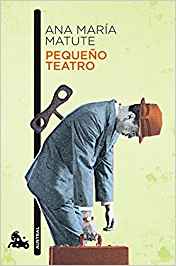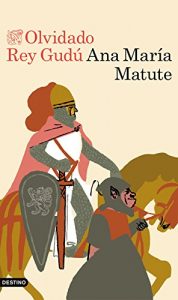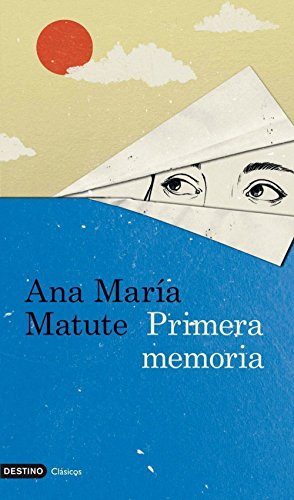Current Spanish literature will always maintain a debt with Ana Maria Matute. A precocious writer, she was able to write great works when she was 17 years old (novels that, once retouched, ended up being best sellers or climbing to the top of the world. Planet award back in 1954, when women still weighed down much of that patriarchal past). It is so extraordinary that the germ of a Planeta Prize novel grew in the hands of an almost adolescent author ...
It is also shocking that a writer with that undeniable gift for narrative sometimes turned to children's and youth literature. Without a doubt commitment to the reading passion as a trainer of more critical and empathetic men and women. And also a way to revalidate genres considered minor and that she worked with real interest for that formative purpose.
But, given what may sound like a brilliant career and a successful life, Ana María Matute did not get rid of the contempt for her condition as a woman, and her talent and ability did not always open all the doors for her, as if it had happened with male authors .
Also personally, Ana Maria Matute It also had its times of light and shadow, marked by some tragic emotional circumstances. Maybe yes or maybe no, creativity also feeds on personal demons. The point is that in the unbridled creative capacity of Ana María Matute there is a lot of good to choose from.
Top 3 recommended novels by Ana María Matute
Small theater
It seems inconceivable that this novel was outlined at 17 years of the author. For that reason alone, this book would have to climb to the top of any writer, but the story is also good.
The world seen with vehemence, disappointment, frustration and a hint of hope typical of any teenager of any age. Premi Planeta 1954. Summary: Puppet theater: humble dolls moved by the dexterity of a kindly old man ...
But human beings too, human beings who throb and bustle in the city, exposing their own miseries, their inclinations, their clumsy feelings, their meanness, their hatred, their reactions ...
Around a helpless adolescent, stir the passions of beings whose ruinness - fantasies, hypocrisy, ambition, cruelty, deceitful dreams - acquire, throughout the narrative and by the successful delimitation of the characters, characters of symbols, although without losing at no time his human condition.
A poetic breath, as befits the author's fine sensitivity, animates all the pages of this interesting novel, which was awarded the 1954 Planeta Prize.
Forgotten King Gudú
The fabulous, sometimes parked as belonging to childhood. And yet nothing is better than personalization towards the metaphor or hyperbole that most accurately defines us. The point is that readings like this take us out of the usual prism, from the navelism and ethnocentrism with which we inevitably act.
In the same way that Saint Exupery made her little prince live in every heart, Ana María Matute makes us change our skin between characters loaded with teachings about human suffering and its foothills towards facing life as an adventure because there is no other choice but to assume that, that death is part , that the loss is undeniable. Tackling everything is that conquest of unknown territories, between magic and its twists and turns, at every dilemma along our path.
Filled with fables and fantasies, it narrates the birth and expansion of the Kingdom of Olar, with a plot full of characters, adventures and a symbolic landscape: the mysterious North, the inhospitable steppe of the East and the rich and exuberant South, which limit the expansion of the Kingdom of Olar, in whose destiny the cunning of a southern girl, the magic of an old sorcerer and the rules of the game of a creature from the subsoil participate. Woven of reality and legend, of past and present, Forgotten King Gudú It is also a great metaphor for the human soul and its history, encouraged by the desires and concerns that have revealed the human being for centuries.
First memory
There is no harsher transition than from childhood to adulthood. To stop being a child may seem like a marked intention in every adolescent, but ... and if what really happens at that "adolescent" age is an act of rebellion, a manifesto against what it is necessary to abandon in order to become ...
If the setting is also a post-war period where the present and the future seem to be the same wall, it can be easily understood that childhood still shines brighter like that paradise from which they are forcibly exiled ... Summary: The protagonists of First memory —Matia, Borja and Manuel— don't want to stop being children. They are adolescents on the brink of adulthood, afraid to look out but aware that they have no alternative, that they have no choice but to do so. Time is up.
And what little they had left is consumed by a war that has just broken out and that is lengthening, in the distance, and overshadows everything. "Whoever has not been, from nine to fourteen years old, attracted and carried from one place to another, from one hand to another, like an object, will not be able to understand my lack of love and rebellion at that time" says an adult Matia, remembering to the Matia of that time, a girl on bare knees, full of rage, banished by parental abandonment on an island whose name is never spoken.
In that long summer of thirty-six, and under the watchful eye of her grandmother, she and her cousin Borja, a devious and charismatic fifteen-year-old boy, unraveled a summer routine made up of lazy Latin lessons, secretly smoked cigarettes, and escapes. by boat to the hidden coves of the island.
Their little secrets and evils, the glimpse of the complexity of the world of the elderly have in Manuel, the eldest son of a family marginalized by all towards whom Matia feels an attachment that she cannot define, a sounding board that shatters the fragile alliance of convenience of the two cousins.
With the first memory, the The Merchants trilogy, conceived years ago in three volumes. The second is entitled, according to a verse by Salvatore Quasimodo, The soldiers cry at night, and the third, The Trap.



